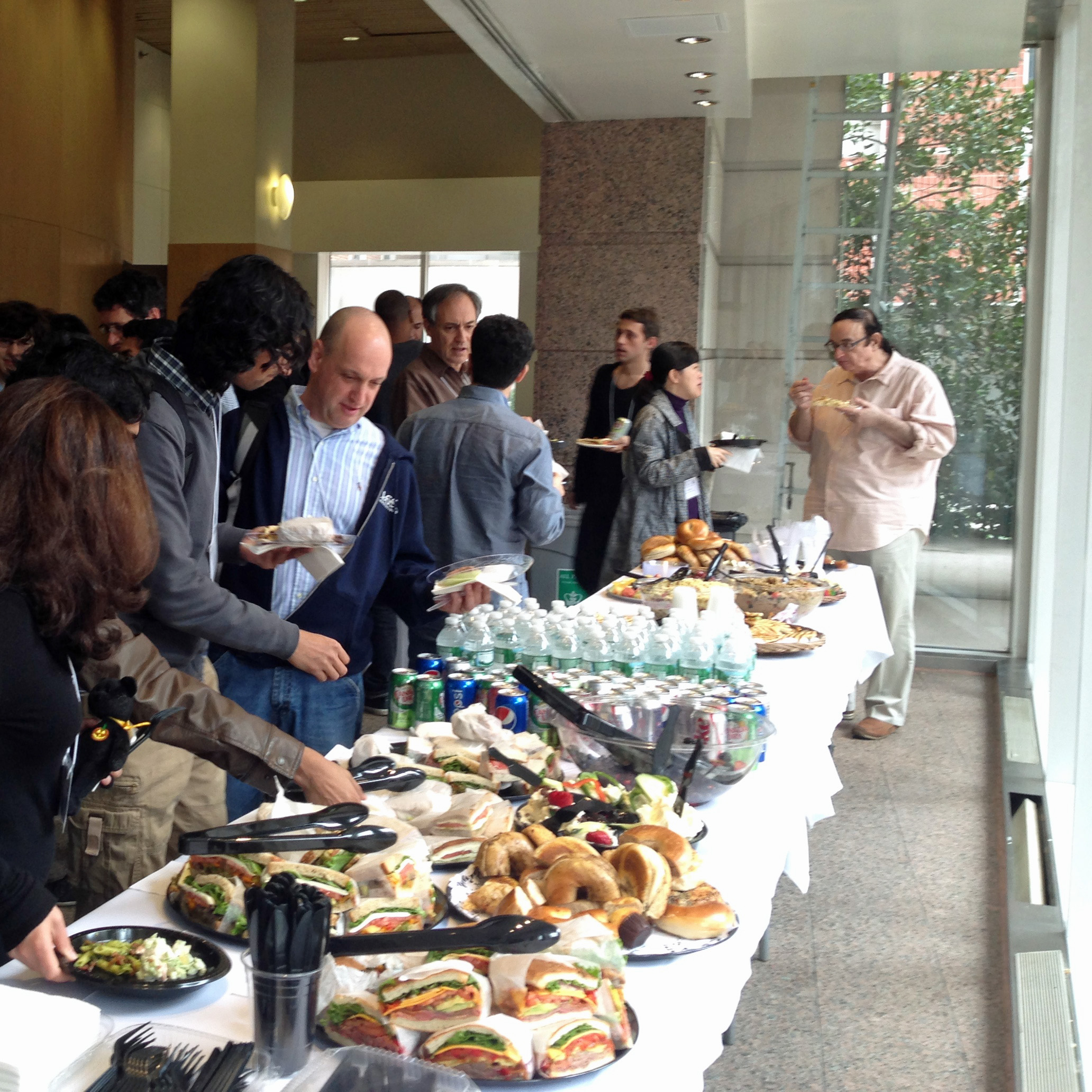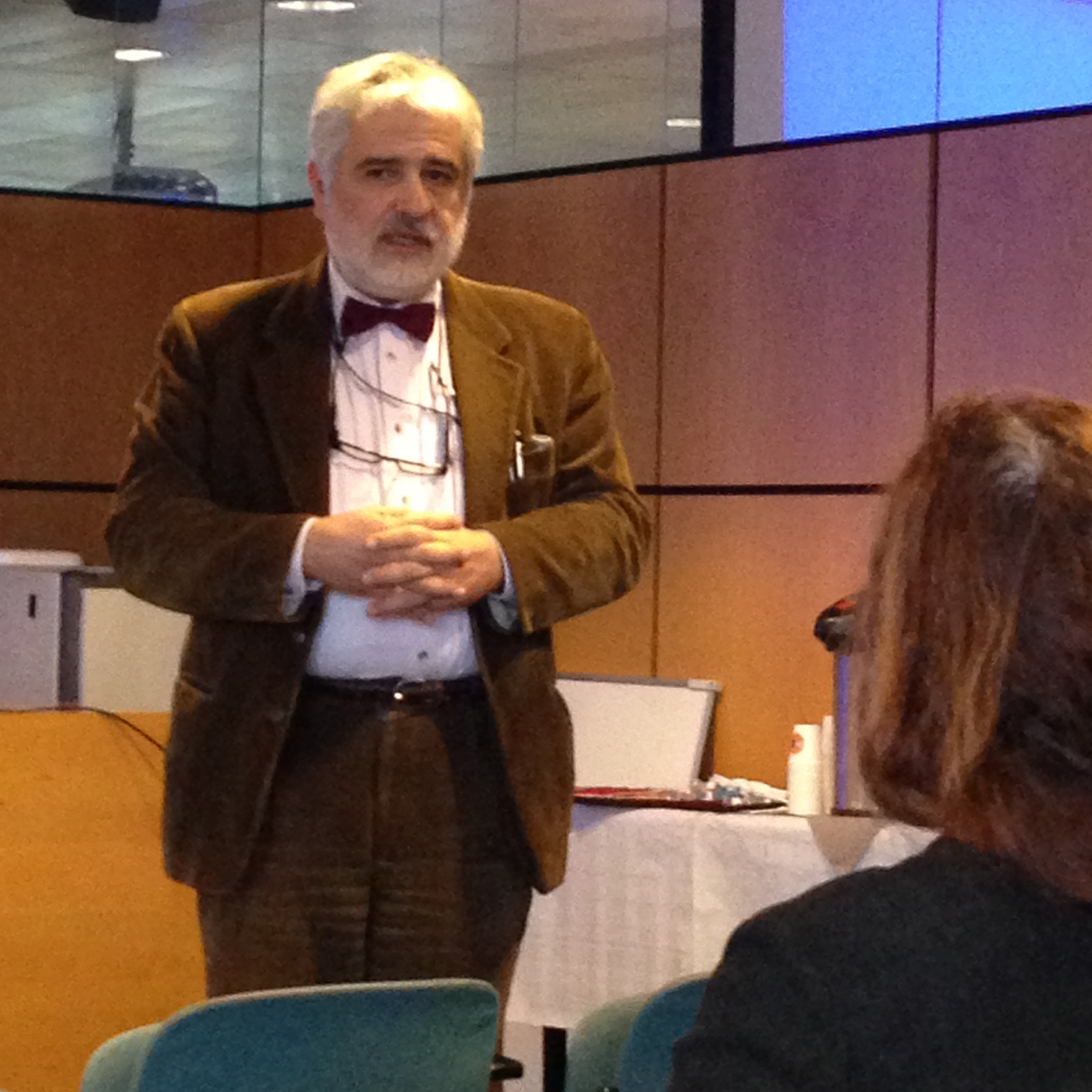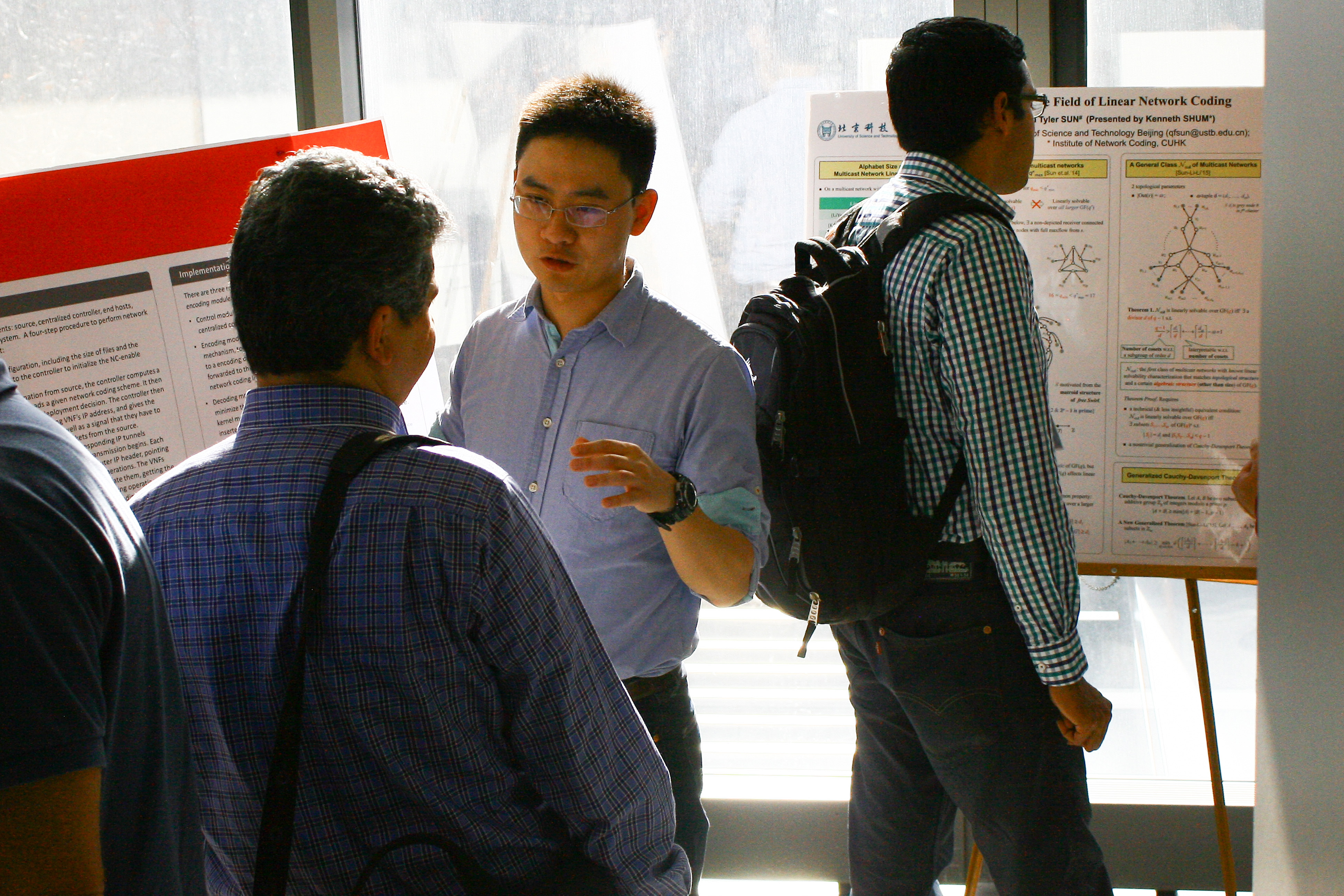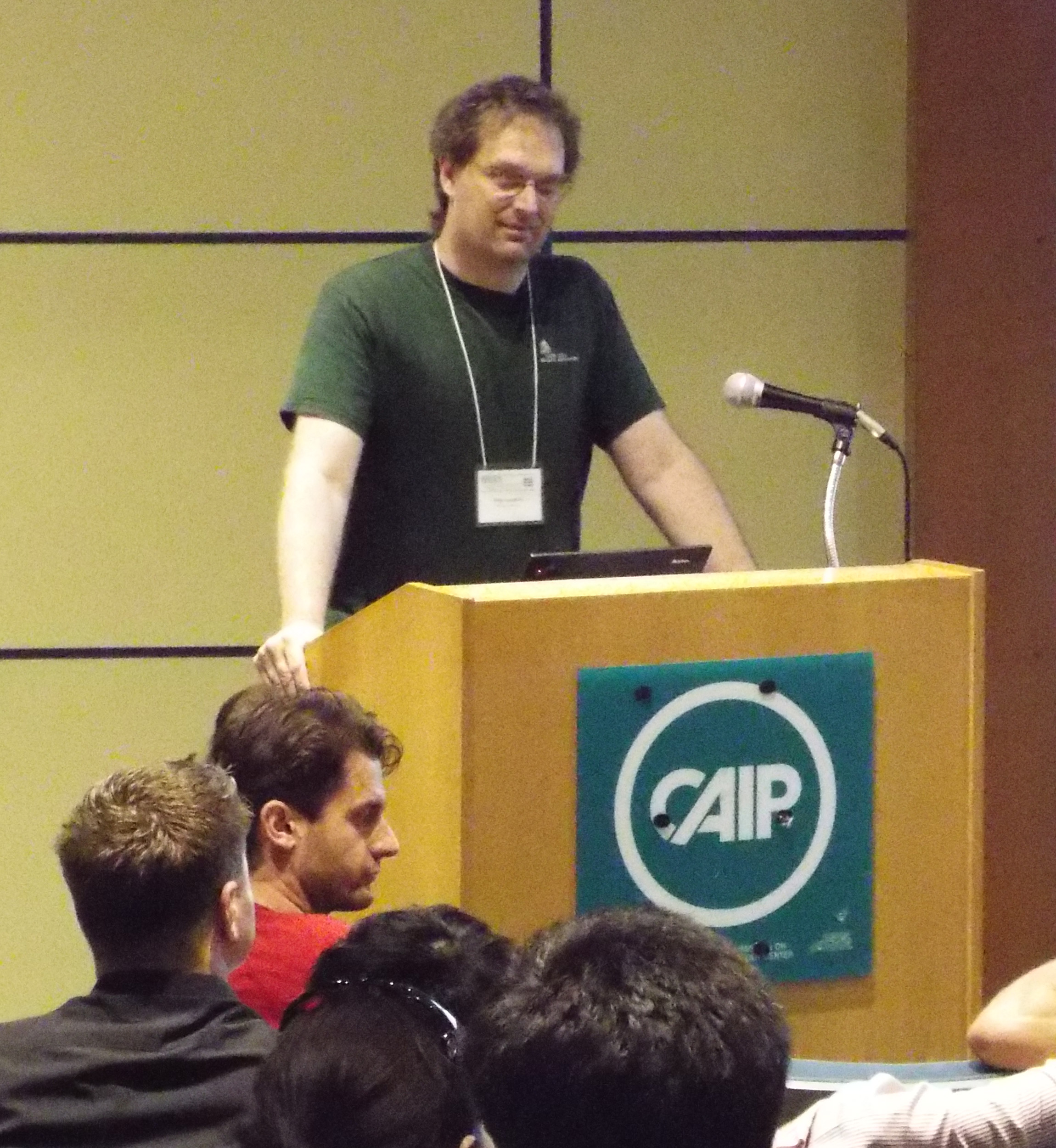
2015 Workshop Wrap Up
[December, 2015] Over its lifetime DIMACS has
run a great many workshops, but December 15, 2015 marked a new
milestone. It was the first time that three DIMACS workshops ran
concurrently. The workshop on “Network Coding:
the Next 15 Years” was held at DIMACS, the workshop on “Cryptography
for Big Data” ran at the Data Science Institute at Columbia
University, and the “MPE 2013+
International Workshop on Citizen Science” took place at the
University of Paris-Dauphine.
The workshop on Cryptography for Big Data was the kickoff event for
the new DIMACS Special
Focus on Cryptography.  It
was co-sponsored by the DIMACS Special
Focus on Information Sharing and Dynamic Data Analysis and the
Columbia Data Science
Institute, where it was held in association with the Northeast
Big Data Hub, immediately preceding the Hub’s inaugural
workshop. The Cryptography for Big Data workshop emphasized
preserving the privacy and integrity of computing on big data,
particularly in scenarios like cloud computing where some of the
parties may not be trusted. The program included research
presentations on topics such as secure RAM computation, trusted
hardware, and “backdoorless” cryptography, as well as three timely
and accessible tutorials: “Computing on Encrypted Data” by Vinod
Vaikuntanathan (MIT); “Exploiting Leakage in Machine Learning and
Searchable Encryption” by Tom Ristenpart (Cornell Tech); and
“Privacy of Secured Computations” by Adam Smith (Penn State). The
workshop also had a panel on privacy challenges in policy and media
that explored the question of how cryptography can potentially help
to ensure civil liberties ranging from privacy of the individual to
free speech and freedom of the press. Videos of tutorials and
research presentations will be posted on the workshop website as
soon as they are available.
It
was co-sponsored by the DIMACS Special
Focus on Information Sharing and Dynamic Data Analysis and the
Columbia Data Science
Institute, where it was held in association with the Northeast
Big Data Hub, immediately preceding the Hub’s inaugural
workshop. The Cryptography for Big Data workshop emphasized
preserving the privacy and integrity of computing on big data,
particularly in scenarios like cloud computing where some of the
parties may not be trusted. The program included research
presentations on topics such as secure RAM computation, trusted
hardware, and “backdoorless” cryptography, as well as three timely
and accessible tutorials: “Computing on Encrypted Data” by Vinod
Vaikuntanathan (MIT); “Exploiting Leakage in Machine Learning and
Searchable Encryption” by Tom Ristenpart (Cornell Tech); and
“Privacy of Secured Computations” by Adam Smith (Penn State). The
workshop also had a panel on privacy challenges in policy and media
that explored the question of how cryptography can potentially help
to ensure civil liberties ranging from privacy of the individual to
free speech and freedom of the press. Videos of tutorials and
research presentations will be posted on the workshop website as
soon as they are available.
 The
workshop on Citizen Science is part of the world-wide Mathematics of Planet
Earth initiative to involve mathematical scientists in
addressing challenges facing the planet. This initiative has led to
a large number of events engaging mathematical scientists with other
researchers to address pressing planetary issues related to climate
change, availability of natural resources, and natural disasters
such as epiemics and floods, among others. The workshop on Citizen
Science arose from a previous workshop on Sustainable
Human Environments, which emphasized the use of data provided
by ordinary citizens to make cities that are “smarter”, more
livable, more resilient, and more sustainable, but citizen science
or “crowd-sourcing” plays an increasingly important role in studies
that range from wildlife monitoring to protein folding. The workshop
discussed challenges in understanding the quality of data that
citizens provide, how to merge citizen data with data from other
sources, and the implications of crowd-sourced data quality for
scientific advances and/or public policy decision making. The
workshop was part of the MPE2013+
project at DIMACS and our longtime partnership with LAMSADE which hosted
the event.
The
workshop on Citizen Science is part of the world-wide Mathematics of Planet
Earth initiative to involve mathematical scientists in
addressing challenges facing the planet. This initiative has led to
a large number of events engaging mathematical scientists with other
researchers to address pressing planetary issues related to climate
change, availability of natural resources, and natural disasters
such as epiemics and floods, among others. The workshop on Citizen
Science arose from a previous workshop on Sustainable
Human Environments, which emphasized the use of data provided
by ordinary citizens to make cities that are “smarter”, more
livable, more resilient, and more sustainable, but citizen science
or “crowd-sourcing” plays an increasingly important role in studies
that range from wildlife monitoring to protein folding. The workshop
discussed challenges in understanding the quality of data that
citizens provide, how to merge citizen data with data from other
sources, and the implications of crowd-sourced data quality for
scientific advances and/or public policy decision making. The
workshop was part of the MPE2013+
project at DIMACS and our longtime partnership with LAMSADE which hosted
the event.
The workshop on Network Coding completed its own “hat trick” of
sorts— it was jointly sponsored by three ongoing
DIMACS special foci (Information
Sharing and Dynamic Data Analysis, Cybersecurity,
and Energy
and Algorithms). The fact that network coding relates three
different special foci reflects its broad potential for improving
data transmission and storage by optimizing not only throughput, but
also delay, reliability, security, and energy efficiency. The
workshop featured presentations on the role of network coding in the
broader area of information theory, algorithms for construction of
codes with specific properties, and the implications of
results in network coding for problems beyond the network coding
domain, such as those in network security, theoretical computer
science, mathematics, and combinatorial optimization. In addition to
the research presentations, the workshop featured a lively poster
session. Recordings of workshop presentations will be posted on the
workshop website.
it was jointly sponsored by three ongoing
DIMACS special foci (Information
Sharing and Dynamic Data Analysis, Cybersecurity,
and Energy
and Algorithms). The fact that network coding relates three
different special foci reflects its broad potential for improving
data transmission and storage by optimizing not only throughput, but
also delay, reliability, security, and energy efficiency. The
workshop featured presentations on the role of network coding in the
broader area of information theory, algorithms for construction of
codes with specific properties, and the implications of
results in network coding for problems beyond the network coding
domain, such as those in network security, theoretical computer
science, mathematics, and combinatorial optimization. In addition to
the research presentations, the workshop featured a lively poster
session. Recordings of workshop presentations will be posted on the
workshop website.
 In addition to the workshops noted above,
the August workshop on Big
Data through the Lens of Sublinear Algorithms was another 2015
highlight. The workshop presentations described some of the hottest
results in the field, and included talks on traditional models for
sublinear computation (such as streaming, property testing, etc.) as
well as more recent ones like MapReduce and other modern distributed
models. There was a healthy mix of speakers from both academia and
industry (represented by researchers from Microsoft, IBM, Google and
Yahoo!), a poster session that involved many students, and two
tutorials – “A Survey of Results in the Message Passing
Communication Model” by David Woodruff (IBM) and “Graph Connectivity
in MapReduce: How Hard Could it Be?” by Sergei Vassilvitskii
(Google). With over 100 registered participants, the workshop was
one of our larger events in 2015. For all who were unable to attend,
presentation
videos are available on the workshop website.
In addition to the workshops noted above,
the August workshop on Big
Data through the Lens of Sublinear Algorithms was another 2015
highlight. The workshop presentations described some of the hottest
results in the field, and included talks on traditional models for
sublinear computation (such as streaming, property testing, etc.) as
well as more recent ones like MapReduce and other modern distributed
models. There was a healthy mix of speakers from both academia and
industry (represented by researchers from Microsoft, IBM, Google and
Yahoo!), a poster session that involved many students, and two
tutorials – “A Survey of Results in the Message Passing
Communication Model” by David Woodruff (IBM) and “Graph Connectivity
in MapReduce: How Hard Could it Be?” by Sergei Vassilvitskii
(Google). With over 100 registered participants, the workshop was
one of our larger events in 2015. For all who were unable to attend,
presentation
videos are available on the workshop website.
Printable version of this story: [PDF]
 DIMACS Homepage
DIMACS Homepage
Contacting the
Center

 It
was co-sponsored by the DIMACS Special
Focus on Information Sharing and Dynamic Data Analysis and the
Columbia Data Science
Institute, where it was held in association with the Northeast
Big Data Hub, immediately preceding the Hub’s inaugural
workshop. The Cryptography for Big Data workshop emphasized
preserving the privacy and integrity of computing on big data,
particularly in scenarios like cloud computing where some of the
parties may not be trusted. The program included research
presentations on topics such as secure RAM computation, trusted
hardware, and “backdoorless” cryptography, as well as three timely
and accessible tutorials: “Computing on Encrypted Data” by Vinod
Vaikuntanathan (MIT); “Exploiting Leakage in Machine Learning and
Searchable Encryption” by Tom Ristenpart (Cornell Tech); and
“Privacy of Secured Computations” by Adam Smith (Penn State). The
workshop also had a panel on privacy challenges in policy and media
that explored the question of how cryptography can potentially help
to ensure civil liberties ranging from privacy of the individual to
free speech and freedom of the press. Videos of tutorials and
research presentations will be posted on the workshop website as
soon as they are available.
It
was co-sponsored by the DIMACS Special
Focus on Information Sharing and Dynamic Data Analysis and the
Columbia Data Science
Institute, where it was held in association with the Northeast
Big Data Hub, immediately preceding the Hub’s inaugural
workshop. The Cryptography for Big Data workshop emphasized
preserving the privacy and integrity of computing on big data,
particularly in scenarios like cloud computing where some of the
parties may not be trusted. The program included research
presentations on topics such as secure RAM computation, trusted
hardware, and “backdoorless” cryptography, as well as three timely
and accessible tutorials: “Computing on Encrypted Data” by Vinod
Vaikuntanathan (MIT); “Exploiting Leakage in Machine Learning and
Searchable Encryption” by Tom Ristenpart (Cornell Tech); and
“Privacy of Secured Computations” by Adam Smith (Penn State). The
workshop also had a panel on privacy challenges in policy and media
that explored the question of how cryptography can potentially help
to ensure civil liberties ranging from privacy of the individual to
free speech and freedom of the press. Videos of tutorials and
research presentations will be posted on the workshop website as
soon as they are available. The
workshop on Citizen Science is part of the world-wide Mathematics of Planet
Earth initiative to involve mathematical scientists in
addressing challenges facing the planet. This initiative has led to
a large number of events engaging mathematical scientists with other
researchers to address pressing planetary issues related to climate
change, availability of natural resources, and natural disasters
such as epiemics and floods, among others. The workshop on Citizen
Science arose from a previous workshop on Sustainable
Human Environments, which emphasized the use of data provided
by ordinary citizens to make cities that are “smarter”, more
livable, more resilient, and more sustainable, but citizen science
or “crowd-sourcing” plays an increasingly important role in studies
that range from wildlife monitoring to protein folding. The workshop
discussed challenges in understanding the quality of data that
citizens provide, how to merge citizen data with data from other
sources, and the implications of crowd-sourced data quality for
scientific advances and/or public policy decision making. The
workshop was part of the MPE2013+
project at DIMACS and our longtime partnership with LAMSADE which hosted
the event.
The
workshop on Citizen Science is part of the world-wide Mathematics of Planet
Earth initiative to involve mathematical scientists in
addressing challenges facing the planet. This initiative has led to
a large number of events engaging mathematical scientists with other
researchers to address pressing planetary issues related to climate
change, availability of natural resources, and natural disasters
such as epiemics and floods, among others. The workshop on Citizen
Science arose from a previous workshop on Sustainable
Human Environments, which emphasized the use of data provided
by ordinary citizens to make cities that are “smarter”, more
livable, more resilient, and more sustainable, but citizen science
or “crowd-sourcing” plays an increasingly important role in studies
that range from wildlife monitoring to protein folding. The workshop
discussed challenges in understanding the quality of data that
citizens provide, how to merge citizen data with data from other
sources, and the implications of crowd-sourced data quality for
scientific advances and/or public policy decision making. The
workshop was part of the MPE2013+
project at DIMACS and our longtime partnership with LAMSADE which hosted
the event.  it was jointly sponsored by three ongoing
DIMACS special foci (Information
Sharing and Dynamic Data Analysis, Cybersecurity,
and Energy
and Algorithms). The fact that network coding relates three
different special foci reflects its broad potential for improving
data transmission and storage by optimizing not only throughput, but
also delay, reliability, security, and energy efficiency. The
workshop featured presentations on the role of network coding in the
broader area of information theory, algorithms for construction of
codes with specific properties, and the implications of
results in network coding for problems beyond the network coding
domain, such as those in network security, theoretical computer
science, mathematics, and combinatorial optimization. In addition to
the research presentations, the workshop featured a lively poster
session. Recordings of workshop presentations will be posted on the
workshop website.
it was jointly sponsored by three ongoing
DIMACS special foci (Information
Sharing and Dynamic Data Analysis, Cybersecurity,
and Energy
and Algorithms). The fact that network coding relates three
different special foci reflects its broad potential for improving
data transmission and storage by optimizing not only throughput, but
also delay, reliability, security, and energy efficiency. The
workshop featured presentations on the role of network coding in the
broader area of information theory, algorithms for construction of
codes with specific properties, and the implications of
results in network coding for problems beyond the network coding
domain, such as those in network security, theoretical computer
science, mathematics, and combinatorial optimization. In addition to
the research presentations, the workshop featured a lively poster
session. Recordings of workshop presentations will be posted on the
workshop website. In addition to the workshops noted above,
the August workshop on Big
Data through the Lens of Sublinear Algorithms was another 2015
highlight. The workshop presentations described some of the hottest
results in the field, and included talks on traditional models for
sublinear computation (such as streaming, property testing, etc.) as
well as more recent ones like MapReduce and other modern distributed
models. There was a healthy mix of speakers from both academia and
industry (represented by researchers from Microsoft, IBM, Google and
Yahoo!), a poster session that involved many students, and two
tutorials – “A Survey of Results in the Message Passing
Communication Model” by David Woodruff (IBM) and “Graph Connectivity
in MapReduce: How Hard Could it Be?” by Sergei Vassilvitskii
(Google). With over 100 registered participants, the workshop was
one of our larger events in 2015. For all who were unable to attend,
presentation
videos are available on the workshop website.
In addition to the workshops noted above,
the August workshop on Big
Data through the Lens of Sublinear Algorithms was another 2015
highlight. The workshop presentations described some of the hottest
results in the field, and included talks on traditional models for
sublinear computation (such as streaming, property testing, etc.) as
well as more recent ones like MapReduce and other modern distributed
models. There was a healthy mix of speakers from both academia and
industry (represented by researchers from Microsoft, IBM, Google and
Yahoo!), a poster session that involved many students, and two
tutorials – “A Survey of Results in the Message Passing
Communication Model” by David Woodruff (IBM) and “Graph Connectivity
in MapReduce: How Hard Could it Be?” by Sergei Vassilvitskii
(Google). With over 100 registered participants, the workshop was
one of our larger events in 2015. For all who were unable to attend,
presentation
videos are available on the workshop website.